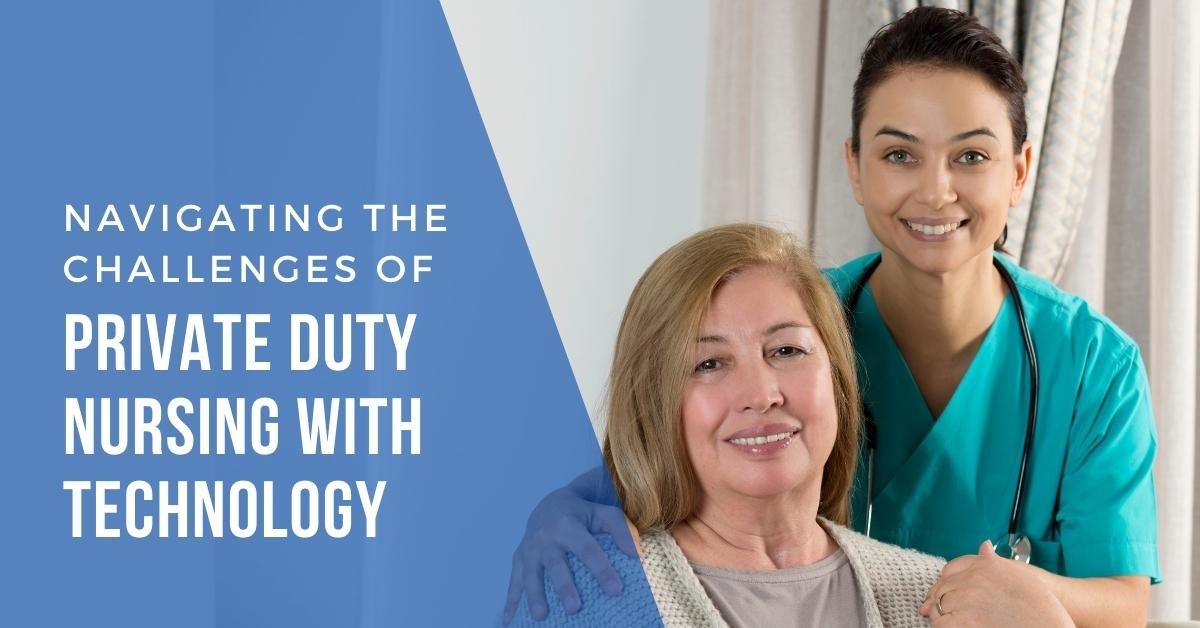2020 and 2021 have been challenging years for home care agencies across the United States. The devastating impact of 2020’s COVID-19 lockdown meant that home care agencies faced a problem they had not experienced ever before. On one side, more patients prefer receiving care at home , on the other side, there are staffing challenges of finding the caregivers to help them cope up with the demand.
Leverage Technology for Effective Management of eMAR, eTAR for Private Duty Nursing Home Care Agencies
Many families and elderly patients are now increasingly considering Hospital-at-home and SNF-at-home models. Private Duty Nursing Home Care agencies are uniquely positioned to take advantage of this trend and grow. Private Duty Nursing Agencies can partner with Hospital Systems or Accountable Care Organizations (ACO) to provide skilled care at home.
Leveraging technology and the right software platform will help Private Duty Nursing Home Care Agencies to implement strategies to effectively manage Electronic Medication and Treatment Administration and ensure patient safety.
Navigating the Challenges of Private Duty Nursing with Technology
Private Duty Home Care agencies can use the right technology and software platform to manage the challenges posed by unique and demanding requirements of providing skilled care at home. Using the right tools will enable home health care agencies to bring operational efficiencies to the organization and take advantage of these new opportunities.
PDGM Notice of Admission and Imperatives for Home Healthcare Agencies
Starting January 1, 2022, Medicare will require Home Health Agencies to submit a one-time Notice of Admission (NOA) instead of Request for anticipated Payment (RAP). Medicare has been phasing out RAP payments for the last two years. The NOA is a one-time submission that establishes the HH POC and covers 30-day payment periods until the patient is discharged.
Software platforms will have to be adjusted to accommodate the new PDGM billing process. The following are some of the requirements.
Benefits of High-Quality Clinical Documentation for Home Health Care Agencies
Comprehensive, consistent, and complete clinical documentation is critical for home health care agencies for the quality of care to the patient and optimum reimbursement. Improving the quality of clinical documentation will significantly enhance the quality of care and patient satisfaction while reducing the risk of compliance issues during surveys. Compliance issues during the survey may lead to reimbursement delays or reductions.
Home Health Care Agencies should implement Clinical Documentation Improvement (CDI) programs to understand that clinical documentation starts at referral and must be managed throughout patient care (Admit through Discharge).
Effective HR and Payroll Management Process for Home Care Agencies
Seamless flow of operational data for payroll processing is key to improving the timeliness and accuracy of the payroll process. This can also reduce the workload for the payroll group. The payroll process starts when the shift is scheduled, not just on payroll day.
This blog highlights some of the challenges that private duty nursing agencies face in processing payroll and discusses potential solutions that integrated software can provide.
Understanding Private Duty Home Care Services and the need for specialized software
As a Home Health Care Software provider, we find ourselves with questions about the nuances of home care services. Some of the questions we get asked are:
What is Private Duty Home Care?
Are RNs required for Private Duty Home Care?
How is it different from Nursing Care?
Do you need specialized software to manage Private Duty Home Care Agencies?
Event Round-up: Texas Association for Home Care & Hospice (TAHC&H) 52nd Annual Meeting
Tools to Improve Quality of Clinical Documentation for Home Health Care
Effective Communication for Home Health Care Agencies to Improve Quality of Care
Millions of patients receive home care every year. Providing quality patient care is critical for home care agencies for patient satisfaction and growth while complying with regulatory requirements. The quality and effectiveness of patient care is a collaborative effort from the entire organization. Communication plays a critical role in improving collaboration, quality of care, and compliance. Home Health Care Agencies need to communicate securely, effectively, and efficiently to ensure the highest quality and level of service.
Home Care Services and the Right Software Platform for Home Health Care Agencies
Integrated EVV Software Platform for Home Care Agencies
Home Health Care agencies should take a holistic view of their needs for a software platform rather than just focusing on their EVV needs. Using an integrated home care software platform to meet all the requirements of a home care agency will provide significant benefits that will outweigh the cost savings of ‘Free’ EVV.
Continuous Care Documentation for Private Duty Home Care Agencies
Nurses providing Private Duty Nursing care work in longer shifts providing continuous care for the same patient. They need to collect and document Vitals and Measurements (Vent Settings, Trach Settings, Cough Logs, Seizure Logs, etc.) and administer medications and treatments multiple times during the shift. Providing continuous care in a longer shift creates unique documentation challenges for nurses and Private Duty Home Care agencies. A software platform should accommodate the challenges of Continuous Care Documentation for Private Duty Nursing Home Care Agencies.
Educational Session: Choosing the right software for private duty nursing
Private Duty Nursing is different from your traditional home health as it requires skilled care for medically fragile patients. The care is typically provided in longer shifts from 8 to 12 hours and for a limited number of patients over a longer period of time. In the Private Duty Nursing field, the nurse or LPN gets to know the patient as a person and can really become quite attached to their patient. The care provided can be in multiple settings such as the patient's home, school, or even a group home setting.
Selecting the right software platform for Home and Community-Based Services
CareVoyant understands the demanding requirements to manage Home and Community Based Services while managing other services like Private Duty Nursing, Non-Medical Personal Care, and Home Health. CareVoyant software platform provides tools that will help a home health care agency to effectively manage Home and Community-Based Services (HCBS) along with other service lines.
Home and Community-Based Services: A Primer
Home and Community-Based Services (HCBS) provide Medicaid beneficiaries opportunities to receive services in their own home or community rather than institutions or other isolated settings. These programs serve various targeted population groups, such as people with intellectual or developmental disabilities, physical disabilities, and mental illnesses.
Top Home Healthcare Trends for 2021
The Importance of Choosing the Right Clearinghouse for your Agency
CareVoyant’s partnership and integration with Waystar demonstrates our commitment to providing operational excellence for our Home Health Agencies, Private Duty Nursing Home Care Agencies, Private Duty Non-Medical Home Care Agencies, Outpatient Therapy providers, and Medical Billing Services providers.
Navigating the challenges of Consumer Directed Services in Home Health Care
Six Traits of a Successful CAREgiver
There are millions of people who serve as caregivers. Whether they work for a private duty nursing services provider, work for a home care agency, or work independently taking care of a family or friend who might need extra assistance, it is imperative to find someone who has the traits necessary to do a job well done.






